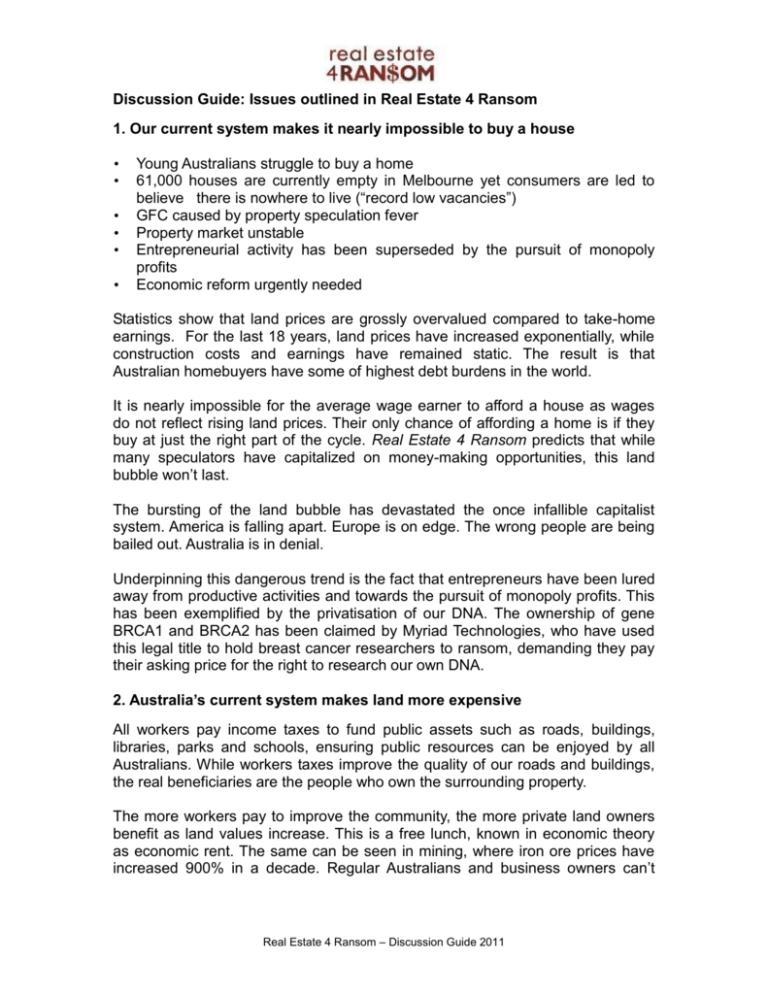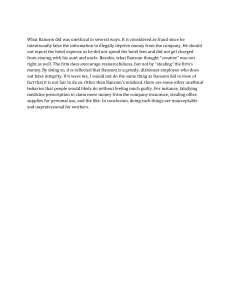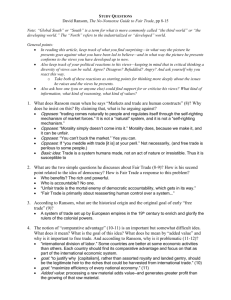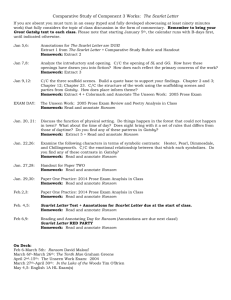Discussion Guide - Real Estate 4 Ransom
advertisement

Discussion Guide: Issues outlined in Real Estate 4 Ransom 1. Our current system makes it nearly impossible to buy a house • • • • • • Young Australians struggle to buy a home 61,000 houses are currently empty in Melbourne yet consumers are led to believe there is nowhere to live (“record low vacancies”) GFC caused by property speculation fever Property market unstable Entrepreneurial activity has been superseded by the pursuit of monopoly profits Economic reform urgently needed Statistics show that land prices are grossly overvalued compared to take-home earnings. For the last 18 years, land prices have increased exponentially, while construction costs and earnings have remained static. The result is that Australian homebuyers have some of highest debt burdens in the world. It is nearly impossible for the average wage earner to afford a house as wages do not reflect rising land prices. Their only chance of affording a home is if they buy at just the right part of the cycle. Real Estate 4 Ransom predicts that while many speculators have capitalized on money-making opportunities, this land bubble won’t last. The bursting of the land bubble has devastated the once infallible capitalist system. America is falling apart. Europe is on edge. The wrong people are being bailed out. Australia is in denial. Underpinning this dangerous trend is the fact that entrepreneurs have been lured away from productive activities and towards the pursuit of monopoly profits. This has been exemplified by the privatisation of our DNA. The ownership of gene BRCA1 and BRCA2 has been claimed by Myriad Technologies, who have used this legal title to hold breast cancer researchers to ransom, demanding they pay their asking price for the right to research our own DNA. 2. Australia’s current system makes land more expensive All workers pay income taxes to fund public assets such as roads, buildings, libraries, parks and schools, ensuring public resources can be enjoyed by all Australians. While workers taxes improve the quality of our roads and buildings, the real beneficiaries are the people who own the surrounding property. The more workers pay to improve the community, the more private land owners benefit as land values increase. This is a free lunch, known in economic theory as economic rent. The same can be seen in mining, where iron ore prices have increased 900% in a decade. Regular Australians and business owners can’t Real Estate 4 Ransom – Discussion Guide 2011 compete with these rising prices - can the local baker really justify increasing their prices by 900%? Real Estate 4 Ransom argues that our current system makes life more expensive. Land speculation is great for investors but financially paralysing for ordinary Australians. 3. Real Estate 4 Ransom recommends a new economic system Land tax system Lower home and rent prices Less tax on business earnings, higher wages for all Australians Increased entrepreneurialism Less speculation Most of our ‘once public’ utilities are now privatised into powerful monopolies. Important utilities such as road and power stations, once owned by all Australians, have been privatised. These companies priorities are profit rather than affordability for ordinary Australians. Real Estate 4 Ransom argues that those who benefit from the use of natural resources and licensed monopolies should be required to pay the community for this privilege per annum. The once off auctioning of our utilities allows too much future value to be captured by the monopolist. A yearly rent on that licence is much fairer for both parties. A significant amount of revenue could be collected through land tax. This would allow for the removal of many other taxes including income, sales and payroll tax. Just as Classical economists Adam Smith and David Ricardo suggested, Real Estate 4 Ransom recommends removing taxes on productive entities such as employers (company and payroll) and increasing taxes on Australian resources such as land and mines. Contemporary advocates of this theory include Dr Ken Henry (recently retired Treasury Secretary) and Joseph Stiglitz (former World Bank Chief economist). Sharing the rising value of land with the community who helped create that value is the most effective way for governments to ensure fairness. A land tax system delivers equality for all – regardless of whether you own a home or not. Real Estate 4 Ransom – Discussion Guide 2011

![The Ransom of Red Chief Short Story[1]](http://s2.studylib.net/store/data/005401282_1-fa610dd217247c87c374953933646519-300x300.png)









